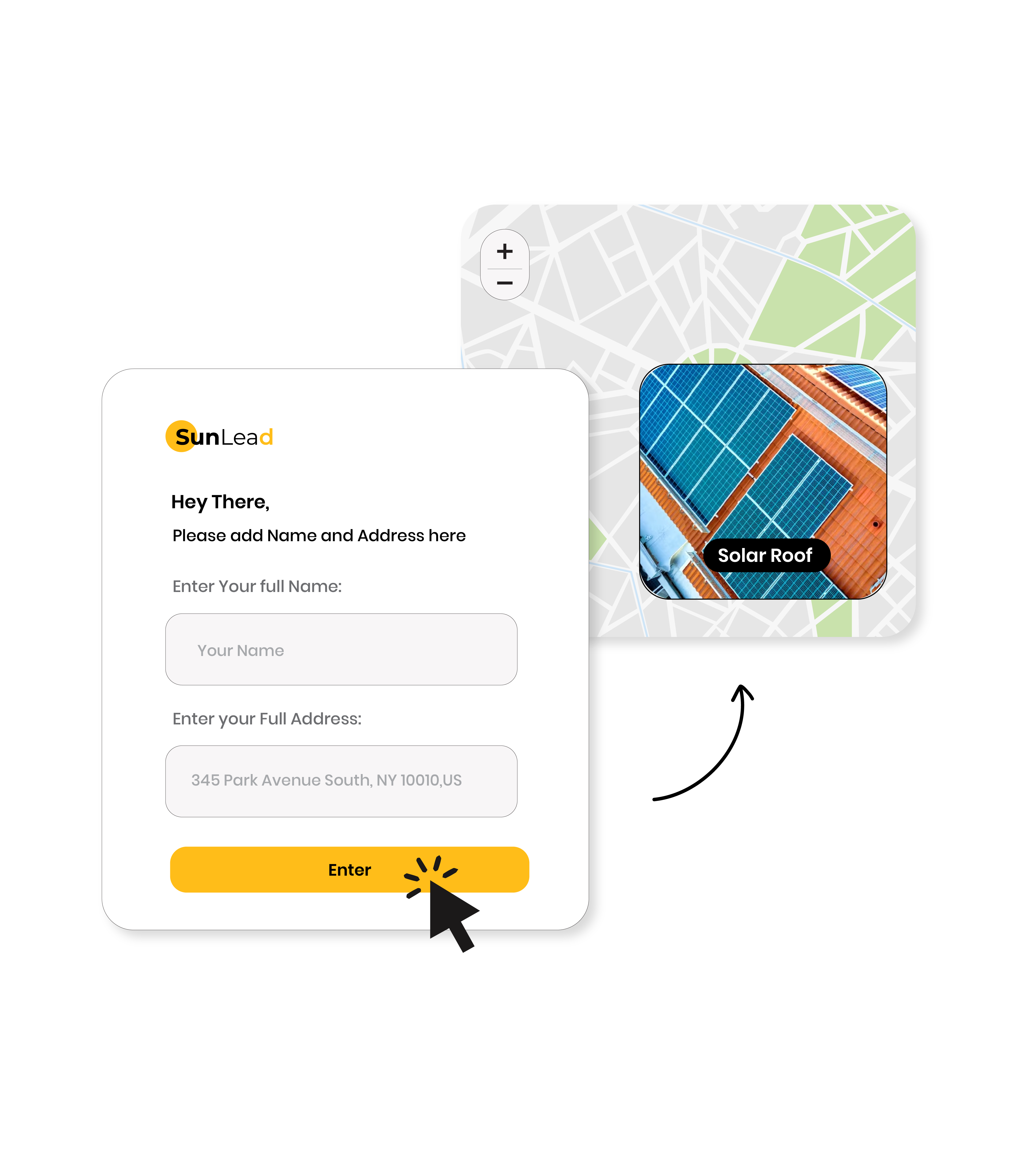Solar Quotation Tool for Lead Generation
Solar Quotation Tool for Lead Generation
Turn your website visitors into leads with SunLead’s online quotation tool. Help your visitors feel confident in going solar by offering instant quotes and rooftop previews.
Turn your website visitors into leads with SunLead’s online quotation tool. Help your visitors feel confident in going solar by offering instant quotes and rooftop previews.


Solar Quotation Tool for Lead Generation
Turn your website visitors into leads with SunLead’s online quotation tool. Help your visitors feel confident in going solar by offering instant quotes and rooftop previews.

Website Visitors Won’t Convert Themselves—Make It Easy with Quotation Tool
Solar companies are investing thousands of dollars in SEO, ads, and social media to drive traffic, but most visitors leave without converting. Without an easy way to capture interest, you’re missing out on valuable leads everyday.
Our Online Quotation Tool provides instant, accurate solar quotes—no forms, no waiting—just real-time pricing that turns visitors into leads.
Instant Answers
Provide quick, personalized solar quotes to capture interest quickly.
Instant Answers
Provide quick, personalized solar quotes to capture interest quickly.
Higher Conversions
Engage visitors with instant quotes and turn them into leads.
Higher Conversions
Engage visitors with instant quotes and turn them into leads.
Maximized ROI
Convert more website visitors and make every marketing dollar count.
Maximized ROI
Convert more website visitors and make every marketing dollar count.
Our Process
Our Process
Maximize Your Website’s Potential with SunLead
01.
Get Started with SunLead
Sign up by entering your company details, setting up your account, and defining your solar products and pricing.
01.
Choose a Plan
Sign up by entering your company details, setting up your account, and defining your solar products and pricing.
02.
Get Your Custom Tool Link
Our system generates a unique link for your solar company. Add it to your website, and you’re done, the tool will handle the rest.
02.
Get Your Custom Tool Link
Our system generates a unique link for your solar company. Add it to your website, and you’re done, the tool will handle the rest.
03.
Empower Your Customers
Let website visitors get instant solar quotes by entering their energy bill or estimated usage, making decisions easier for them.
03.
Empower Your Customers
Let website visitors get instant solar quotes by entering their energy bill or estimated usage, making decisions easier for them.
04.
Boost Conversions Instantly
Engages visitors with savings breakdowns, turning interest into leads and driving more solar installations.
04.
Boost Conversions Instantly
Engages visitors with savings breakdowns, turning interest into leads and driving more solar installations.








Start boosting your Solar Conversions today!
Start boosting your Solar Conversions today!
Signup Now
Signup Now
Website Visitors Won’t Convert Themselves—Make It Easy with Quotation Tool
Solar companies are investing thousands of dollars in SEO, ads, and social media to drive traffic, but most visitors leave without converting. Without an easy way to capture interest, you’re missing out on valuable leads everyday.
Our Online Quotation Tool provides instant, accurate solar quotes—no forms, no waiting—just real-time pricing that turns visitors into leads.
Instant Answers
Provide quick, personalized solar quotes to capture interest quickly.
Higher Conversions
Engage visitors with instant quotes and turn them into leads.
Maximized ROI
Convert more website visitors and make every marketing dollar count.
Our Process
Maximize Your Website’s Potential with SunLead
01.
Choose a Plan
Sign up by entering your company details, setting up your account, and defining your solar products and pricing.
02.
Get Your Custom Tool Link
Our system generates a unique link for your solar company. Add it to your website, and you’re done, the tool will handle the rest.
03.
Empower Your Customers
Let website visitors get instant solar quotes by entering their energy bill or estimated usage, making decisions easier for them.
04.
Boost Conversions Instantly
Engages visitors with savings breakdowns, turning interest into leads and driving more solar installations.




Start boosting your Solar Conversions today!
Signup Now
Benefits
Benefits
Advantages You’ll Unfold With SunLead's Quotation Tool
Benefits
Advantages you’ll unfold with SunLead's Quotation Tool





Easy Integration
SunLead requires no IT support, making it hassle-free to enhance your website. Just integrate, go live, and improve customer decision-making.
Own Your Leads
Read more
Customize To Your Brand
Read more
Build Visitor Trust
Read more
Get Started





Easy Integration
SunLead requires no IT support, making it hassle-free to enhance your website. Just integrate, go live, and improve customer decision-making.
Own Your Leads
Read more
Customize To Your Brand
Read more
Build Visitor Trust
Read more
Get Started





Easy Integration
SunLead requires no IT support, making it hassle-free to enhance your website. Just integrate, go live, and improve customer decision-making.
Own Your Leads
Read more
Customize To Your Brand
Read more
Build Visitor Trust
Read more
Get Started
Features
Features
Features
Precision Panel Layout That Sells
While most tools leave panel placement to the imagination, ours brings it to life. We seamlessly and accurately map solar panels onto the rooftop, factoring in every setback and obstruction. The result?
A crystal-clear visual that builds trust, eliminates guesswork and drives conversions.
While most tools leave panel placement to the imagination, ours brings it to life. We seamlessly and accurately map solar panels onto the rooftop, factoring in every setback and obstruction. The result?
A crystal-clear visual that builds trust, eliminates guesswork and drives conversions.
While most tools leave panel placement to the imagination, ours brings it to life. We seamlessly and accurately map solar panels onto the rooftop, factoring in every setback and obstruction. The result?
A crystal-clear visual that builds trust, eliminates guesswork and drives conversions.
Best Part
"When customers see exactly how solar will look on their roof, they’re far more likely to say yes."



Case Study
Case Study
Case Study
How Sunny Energy Maximized ROI with SunLead
How Sunny Energy Maximized ROI with SunLead
How Sunny Energy Maximized ROI with SunLead
Challenge
Challenge
Sunny Energy, a solar company — needed a way to capture qualified solar leads from their website who were genuinely interested in solar lead generation solutions. Traditional methods weren't delivering the results they desired.
Sunny Energy, a solar company — needed a way to capture qualified solar leads from their website who were genuinely interested in solar lead generation solutions. Traditional methods weren't delivering the results they desired.
Solution
Solution
Sunny Energy implemented SunLead’s Quotation tool which not only streamlined their workflow but also significantly boosted their conversion rates, ultimately delivering the ROI they had been striving for.
Sunny Energy implemented SunLead’s Quotation tool which not only streamlined their workflow but also significantly boosted their conversion rates, ultimately delivering the ROI they had been striving for.
Challenge
Sunny Energy, a solar company — needed a way to capture qualified solar leads from their website who were genuinely interested in solar lead generation solutions. Traditional methods weren't delivering the results they desired.
Solution
Sunny Energy implemented SunLead’s Quotation tool which not only streamlined their workflow but also significantly boosted their conversion rates, ultimately delivering the ROI they had been striving for.
2,954 quotes provided
Sunny Energy provided nearly 3,000 quotes to online users, demonstrating strong customer engagement, in just a year.



343 qualified leads
The quotation tool filtered out unqualified inquiries, resulting in 343 high-quality leads.
124 appointments & 39+ Sales
Sunny Energy converted over 36% of leads into appointments with impressive close rates of 11-14%.
Residual Sales Boost
Positive impact beyond the directly tracked conversions. Satisfied customers who used the quote tool often mentioned it as a key factor in their decision, leading to additional phone inquiries and sales.
Trusted by Leading Businesses
Trusted by Leading Businesses
Trusted by Leading Businesses
Hear What Our Clients Say About Us
Hear What Our Clients Say About Us
100%
100%
100%
Satisfaction Rate
Satisfaction Rate
Satisfaction Rate
14%
14%
14%
Closure Rate
Closure Rate
Closure Rate
“We’ve achieved remarkable close ratios of 11% to 14% from appointments to sales using SunLead’s online quotation tool. The tool’s impact goes beyond direct conversions, contributing to additional sales that enhance its overall success.
As our user base has grown over the past two years, we’ve consistently seen similar funnel ratios, a testament to the tool’s effectiveness.
Our focus on improving customer experience has been pivotal, and now we’re eager to introduce more consumers to its benefits.”
What We Did
What We Did
What We Did
We’ve made solar lead conversion easier, more cost-effective, and faster for our customers.

Pricing
Elevate Your Solar Business with SunLead Quotation Tool
Monthly
Get started your way!
$299/month
Instant Personalized Quotes
Enhanced User Experience for Leads Conversion
Solar Rooftop Previews
Get a 7-day free trial
Annually
Save up to 33% Annually!
$199/month
Instant Personalized Quotes
Lower Customer Acquisition Costs by 80%
Enhanced User Experience for Leads Conversion
Get a 7-day free trial

Pricing
Elevate Your Solar Business with SunLead Quotation Tool
Monthly
Get started your way!
$299/month
Instant Personalized Quotes
Enhanced User Experience for Leads Conversion
Solar Rooftop Previews
Get a 7-day free trial
Annually
Save up to 33% Annually!
$199/month
Instant Personalized Quotes
Lower Customer Acquisition Costs by 80%
Enhanced User Experience for Leads Conversion
Get a 7-day free trial

Pricing
Elevate Your Solar Business with SunLead Quotation Tool
Monthly
Get started your way!
$299/month
Instant Personalized Quotes
Enhanced User Experience for Leads Conversion
Solar Rooftop Previews
Get a 7-day free trial
Annually
Save up to 33% Annually!
$199/month
Instant Personalized Quotes
Lower Customer Acquisition Costs by 80%
Enhanced User Experience for Leads Conversion
Get a 7-day free trial
Blogs
Blogs
Blogs



Must Read
Must Read
Must Read
Conquer 13 Solar Lead Generation Challenges and Overcoming them
Overcome 13 common solar lead generation challenges with effective solutions. Learn strategies to tackle obstacles and enhance your lead generation efforts.
Overcome 13 common solar lead generation challenges with effective solutions. Learn strategies to tackle obstacles and enhance your lead generation efforts.
FAQ
FAQ
Have Questions?
We Have Answers
Have Questions?
We Have Answers
FAQ
Have Questions?
We Have Answers
How does the online quotation tool work for residential solar companies?
How does the online quotation tool work for residential solar companies?
Can I customize the quotation tool to match my company's branding?
Can I customize the quotation tool to match my company's branding?
How does the quotation tool generate leads for my solar business?
How does the quotation tool generate leads for my solar business?
What are the most effective methods for generating high-quality solar leads?
What are the most effective methods for generating high-quality solar leads?
How can I improve the conversion rate of my solar leads?
How can I improve the conversion rate of my solar leads?
What are the common challenges in solar lead generation, and how can they be overcome?
What are the common challenges in solar lead generation, and how can they be overcome?
How does the online quotation tool work for residential solar companies?
Can I customize the quotation tool to match my company's branding?
How does the quotation tool generate leads for my solar business?
What are the most effective methods for generating high-quality solar leads?
How can I improve the conversion rate of my solar leads?
What are the common challenges in solar lead generation, and how can they be overcome?





